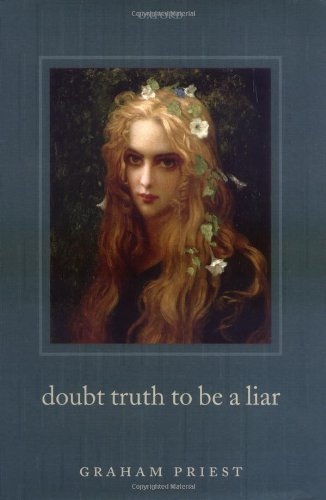

Most ebook files are in PDF format, so you can easily read them using various software such as Foxit Reader or directly on the Google Chrome browser.
Some ebook files are released by publishers in other formats such as .awz, .mobi, .epub, .fb2, etc. You may need to install specific software to read these formats on mobile/PC, such as Calibre.
Please read the tutorial at this link: https://ebookbell.com/faq
We offer FREE conversion to the popular formats you request; however, this may take some time. Therefore, right after payment, please email us, and we will try to provide the service as quickly as possible.
For some exceptional file formats or broken links (if any), please refrain from opening any disputes. Instead, email us first, and we will try to assist within a maximum of 6 hours.
EbookBell Team

4.1
50 reviews
ISBN 10: 0199263280
ISBN 13: 9780199263288
Author: Graham Priest
Dialetheism is the view that some contradictions are true. This is a view which runs against orthodoxy in logic and metaphysics since Aristotle, and has implications for many of the core notions of philosophy. Doubt Truth to Be a Liar explores these implications for truth, rationality, negation, and the nature of logic, and develops further the defence of dialetheism first mounted in Priest's In Contradiction, a second edition of which is also available.
PART I: TRUTH
1. Aristotle on the Law of Non-Contradiction
1.1 Introduction
1.2 The Law of Non-Contradiction (5[sup(b)]18–22)
1.3 The Firmest of All Principles (5[sup(b)]22–35)
1.4 Aristotle’s Opponents
1.5 Demonstration by Refutation (5[sup(b)]35–6[sup(a)]28)
1.6 First Refutation: Part I (6[sup(a)]28–[sup(b)]34)
1.7 First Refutation: Interlude (6[sup(b)]34–7[sup(a)]20)
1.8 Aristotle on Substance
1.9 First Refutation: Part II (7[sup(a)]20–[sup(b)]18)
1.10 The Anscombe/Cresswell Interpretation
1.11 Some Modern Variations I: Talking of Objects
1.12 Some Modern Variations II: Meaning
1.13 Some Modern Variations III: Negation as Cancellation
1.14 Second Refutation: Eleatic Monism (7[sup(b)]18–8[sup(a)]2)
1.15 Third Refutation: The LEM and Assertion (8[sup(a)]2–7)
1.16 Fourth Refutation: An Argument by Cases (8[sup(a)]7–34)
1.17 Fifth Refutation: The Truth-Conditions of Negation (8[sup(a)]34–[sup(b)]2)
1.18 Sixth Refutation: Part I, The Vegetable (8[sup(b)]2–12)
1.19 Sixth Refutation: Part II, Action (8[sup(b)]12–31)
1.20 Seventh Refutation: Teleology (8[sup(b)]31–9[sup(a)]6)
1.21 Conclusion
2. Theories of Truth
2.1 Introduction
2.2 The Deflationist Theory of Truth
2.3 The Semantic Theory of Truth
2.4 The Teleological Theory of Truth
2.5 The Pragmatist Theory of Truth
2.6 The Coherence Theory of Truth
2.7 The Correspondence Theory of Truth
2.8 Conclusion
3. Trivialism
3.1 Introduction
3.2 Seeing Contradictions
3.3 Perceptual Illusions
3.4 The Non-Triviality of the World
3.5 The Consistency of the Empirical World
3.6 The Trivialist
3.7 Argument One: Evidence
3.8 Argument Two: Meaning
3.9 Argument Three: The Phenomenology of Choice
3.10 Conclusion
PART II: NEGATION
4. Contradiction
4.1 Introduction
4.2 Negation or Negations?
4.3 Contradictories
4.4 The Laws of Excluded Middle and Non-Contradiction
4.5 Truth and Falsity
4.6 Truth and Contradiction
4.7 Arrow Falsum
4.8 Reductio ad Absurdum
4.9 Conclusion
5. Boolean Negation
5.1 Introduction
5.2 Information and Augmentation
5.3 Boolean Negation by Proof Theory
5.4 Conservative Extension
5.5 Harmony
5.6 Boolean Negation by Model Theory
5.7 Explosion
5.8 Boolean Negation Negated
5.9 Curry Conditionals
5.10 Conclusion
6. Denial and Rejection
6.1 Introduction
6.2 Negation and Denial
6.3 Expressibility
6.4 Denial and Paradox
6.5 Truth and Rejection
6.6 Rational Dilemmas
6.7 Game-Theoretic Dilemmas
6.8 Objections
6.9 Conclusion
PART III: RATIONALITY
7. Rational Belief
7.1 Introduction
7.2 The History of the Belief in Consistency
7.3 Is Consistency Mandatory?
7.4 Rationality and Consistency
7.5 The Rationality of Inconsistency
7.6 Conclusion
8. Belief Revision
8.1 Introduction
8.2 Background: The AGM Conditions
8.3 Inconsistent Belief
8.4 Paraconsistency
8.5 Multiple Criteria
8.6 Formal Models
8.7 The AGM Conditions Revisited
8.8 Conclusion
9. Consistency and the Empirical Sciences
9.1 Introduction
9.2 Inconsistency and Observation
9.3 Types of Inconsistency
9.4 Handling Inconsistency
9.5 Accepting Inconsistent Information
9.6 Inconsistency and Truth
9.7 Inconsistent Mathematics
9.8 Conclusion
PART IV: LOGIC
10. Logic and Revisability
10.1 Introduction
10.2 Logics, Geometries, and Arithmetics
10.3 Non-Euclidean Geometry
10.4 Non-Standard Arithmetics
10.5 Models of the Inconsistent
10.6 Inconsistent Arithmetics
10.7 Empirical Applications
10.8 Revising Logic: The Case of Syllogistic
10.9 Quine and Meaning-variance
10.10 Rivalry
10.11 Quine in Defence of Classical Logic
10.12 Logic and Translation
10.13 Realism vs. Instrumentalism in Logic
10.14 Localism vs. Globalism
10.15 Conclusion
11. Validity
11.1 Introduction
11.2 Validity: A First Pass
11.3 Proof-theoretic Characterization
11.4 Model-theoretic Characterization
11.5 Filling in The Details
11.6 The Tarskian Account
11.7 Inductive Validity
11.8 Probability
11.9 Non-monotonic Logic
11.10 Consequences of This Account
11.11 Normativity and Information Preservation
11.12 Conclusion
12. Logical Pluralism
12.1 Introduction
12.2 Pure and Applied Logic
12.3 Theoretical Pluralism
12.4 The Canonical Application of Logic
12.5 Validity
12.6 Domain Variation
12.7 Context Dependence
12.8 Logical Constants and Variables
12.9 Classes of Situation
12.10 Instrumentalism
12.11 Under-determination by the Data
12.12 Inductive Inference
12.13 Conclusion
12.14 To Be and Not to Be—That is the Answer
shakespeare doubt truth to be a liar
hamlet doubt truth to be a liar
doubt truth to be a liar meaning
the royals doubt truth to be a liar
what does doubt truth to be a liar mean
priest doubt-truth-to-be-a-liar
Tags: Graham Priest, Doubt, Truth